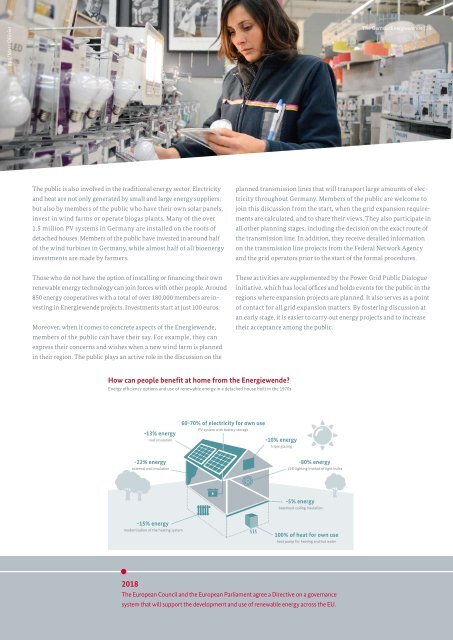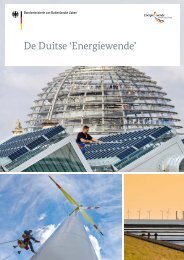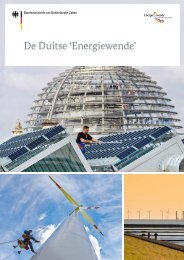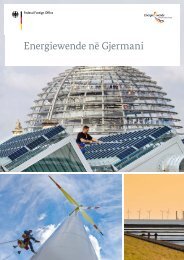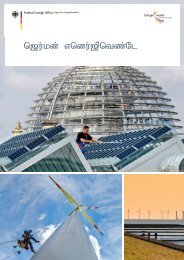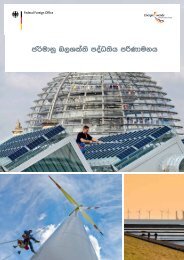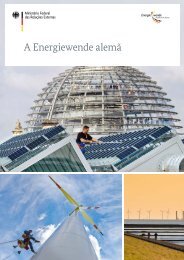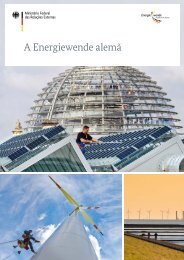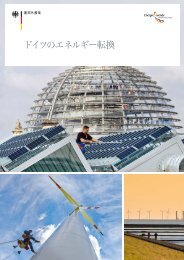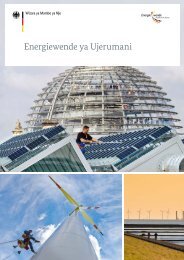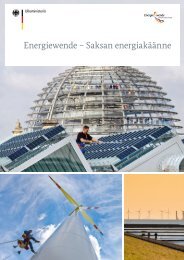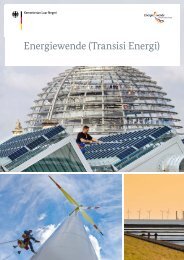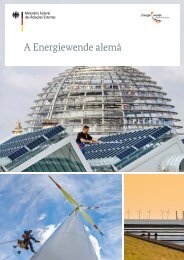The German Energiewende
Create successful ePaper yourself
Turn your PDF publications into a flip-book with our unique Google optimized e-Paper software.
dpa/Marc Ollivier<br />
<strong>The</strong> <strong>German</strong> <strong>Energiewende</strong> | 29<br />
<strong>The</strong> public is also involved in the traditional energy sector. Electricity<br />
and heat are not only generated by small and large energy suppliers,<br />
but also by members of the public who have their own solar panels,<br />
invest in wind farms or operate biogas plants. Many of the over<br />
1.5 million PV systems in <strong>German</strong>y are installed on the roofs of<br />
detached houses. Members of the public have invested in around half<br />
of the wind turbines in <strong>German</strong>y, while almost half of all bioenergy<br />
investments are made by farmers.<br />
planned transmission lines that will transport large amounts of electricity<br />
throughout <strong>German</strong>y. Members of the public are welcome to<br />
join this discussion from the start, when the grid expansion requirements<br />
are calculated, and to share their views. <strong>The</strong>y also participate in<br />
all other planning stages, including the decision on the exact route of<br />
the transmission line. In addition, they receive detailed information<br />
on the transmission line projects from the Federal Network Agency<br />
and the grid operators prior to the start of the formal procedures.<br />
Those who do not have the option of installing or financing their own<br />
renewable energy technology can join forces with other people. Around<br />
850 energy cooperatives with a total of over 180,000 members are investing<br />
in <strong>Energiewende</strong> projects. Investments start at just 100 euros.<br />
Moreover, when it comes to concrete aspects of the <strong>Energiewende</strong>,<br />
members of the public can have their say. For example, they can<br />
express their concerns and wishes when a new wind farm is planned<br />
in their region. <strong>The</strong> public plays an active role in the discussion on the<br />
<strong>The</strong>se activities are supplemented by the Power Grid Public Dialogue<br />
initiative, which has local offices and holds events for the public in the<br />
regions where expansion projects are planned. It also serves as a point<br />
of contact for all grid expansion matters. By fostering discussion at<br />
an early stage, it is easier to carry out energy projects and to increase<br />
their acceptance among the public.<br />
How can people benefit at home from the <strong>Energiewende</strong>?<br />
Energy efficiency options and use of renewable energy in a detached house built in the 1970s<br />
-13% energy<br />
roof insulation<br />
-22% energy<br />
external wall insulation<br />
60-70% of electricity for own use<br />
PV system with battery storage<br />
-10% energy<br />
triple glazing<br />
-80% energy<br />
LED lighting instead of light bulbs<br />
-5% energy<br />
basement ceiling insulation<br />
-15% energy<br />
modernisation of the heating system<br />
100% of heat for own use<br />
heat pump for heating and hot water<br />
2018<br />
<strong>The</strong> European Council and the European Parliament agree a Directive on a governance<br />
system that will support the development and use of renewable energy across the EU.


